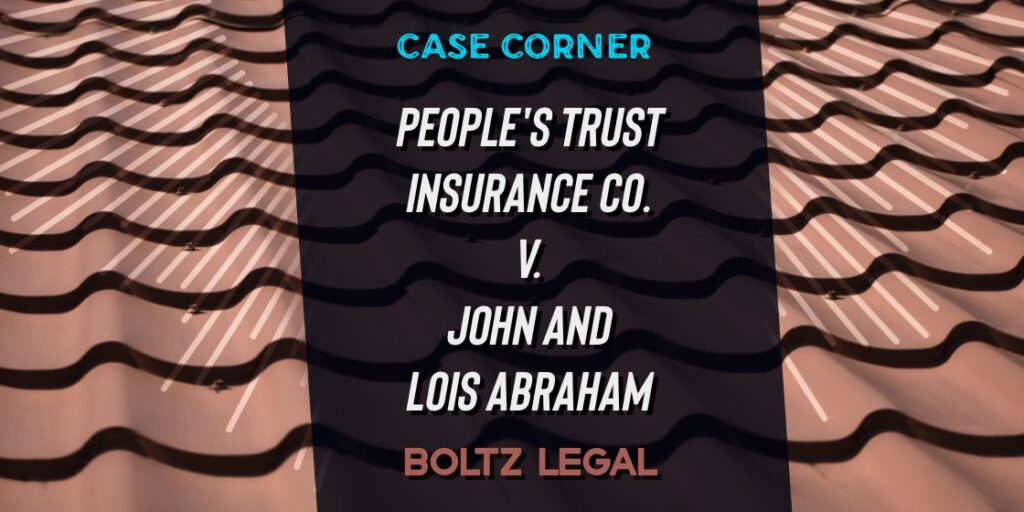Second District Court of Appeal, State of Florida
Case No. 2D2023-2383
Opinion Filed: May 7, 2025
Judges: Khouzam, Rothstein-Youakim, and Labrit, JJ.
Legal Area: Homeowners Insurance – Election to Repair – Contractor Licensing – Summary Judgment
The Second District Court of Appeal reversed a trial court ruling in favor of two homeowners who refused to sign a repair authorization form from their insurer. At the heart of this dispute was whether a general contractor—rather than a licensed roofing contractor—could perform repairs when roofing constituted the majority of the work. The appellate court ruled that not only could they do so, but that the homeowners’ refusal to cooperate breached their policy obligations.
Background: Insurance, Storm Damage, and a Disputed Repair Plan
John and Lois Abraham held a homeowners insurance policy with People’s Trust Insurance Company. Their policy included a right-to-repair endorsement, giving the insurer the option to make necessary repairs using its designated contractor—Rapid Response Team, LLC (RRT)—instead of issuing a cash payout.
After the Abrahams filed a claim for storm damage, People’s Trust invoked its right to repair. An appraisal determined that most of the damage involved the roof. The insurer sent a standard Work Authorization form for the homeowners to sign, which would have allowed RRT to begin repairs and enter the property.
The Abrahams, however, refused to sign and did not pay their deductible. Their reason? RRT held a general contractor’s license, not a roofing contractor license—and they argued that having RRT repair the roof would be illegal under Florida Statutes.
The Trial Court’s Ruling: Authorization Equals Illegality?
The trial court sided with the Abrahams, agreeing that the work authorization was unenforceable because most of the work involved the roof. Since RRT lacked a roofing license, the court ruled that authorizing RRT to perform the repairs would violate section 489.113 of the Florida Statutes.
The court also held that People’s Trust had breached the contract by failing to provide documentation proving RRT’s licensure—even though the policy only required People’s Trust to instruct RRT to supply the documentation, not to deliver it themselves.
On Appeal: Two Simple Legal Questions
On appeal, the Second District Court focused on two key issues:
- Was it illegal for RRT, a general contractor, to perform the roofing work?
- Did People’s Trust breach the policy by not directly providing RRT’s licensing documentation?
In both instances, the appellate court disagreed with the trial court.
Roofing Repairs and Licensing: What the Law Actually Says
Florida law requires that roofing work be subcontracted if the prime contractor (in this case, RRT) lacks a roofing license. However, that does not mean the general contractor is disqualified from overseeing the work.
Section 489.113(3) explicitly states that a general contractor “shall subcontract” specialty work—like roofing—unless they are licensed in that trade. Crucially, the general contractor remains responsible for the work, including that of the subcontractor.
The appellate court cited People’s Trust Ins. Co. v. Lamolli, a nearly identical case decided by Florida’s Fourth District Court of Appeal. That case involved the same insurer, the same contractor, and similar facts. There, the court clearly held that a general contractor may oversee roofing work through a licensed subcontractor and still comply with state law.
In this case, the Abrahams’ argument relied on subsection 489.113(9)(a), which permits specialty contractors to act as a prime contractor when most of the work is within their license. But as the court pointed out, this subsection does not prohibit anything—it simply grants permission and does not invalidate general contractors acting as prime under broader circumstances.
Work Authorization and Documentation: A Policy Misreading
The trial court also erred in holding that People’s Trust was obligated to “cause” RRT to produce licensing documents. The policy language was clear: the insurer agreed to “instruct” RRT to provide the documents and “may, at [its] option, assist” in providing them. There was no contractual duty requiring People’s Trust to deliver those documents directly.
The appellate court emphasized a longstanding principle of Florida law: when policy language is plain and unambiguous, courts must enforce it as written. Since People’s Trust fulfilled its contractual duty by instructing RRT to supply the documents, no breach occurred.
Key Legal Takeaways: Repair Rights and Homeowners’ Duties
- Right to Repair Must Be Honored
If a policy includes a right-to-repair clause and the insurer exercises that right, the insured must cooperate. Refusal to do so is a material breach. - General Contractors Can Oversee Roofing Work
A general contractor without a roofing license may legally oversee roofing repairs by subcontracting the work to a properly licensed roofer. - Policy Language Matters
Insurers are only held to the duties they expressly undertake in the policy. Courts will not rewrite policies to add obligations that aren’t there. - Precedent Matters
Trial courts must follow the rulings of other district courts unless conflicting appellate decisions exist. The trial court in this case failed to apply binding precedent from Lamolli.
Final Judgment
The Second District Court of Appeal reversed the trial court’s decision and ordered judgment in favor of People’s Trust Insurance Company. The Abrahams’ refusal to sign the Work Authorization and pay their deductible constituted a clear breach of the insurance policy. The court also clarified that general contractors like RRT may legally supervise roofing repairs as long as licensed subcontractors handle the work.
Today’s Insight
“A right delayed is a right denied.”
— Martin Luther King Jr.
In disputes involving insurance contracts and homeowners’ obligations, time and clarity are critical. Refusing to comply based on a misreading of the law can delay rightful remedies—and ultimately backfire in court.

